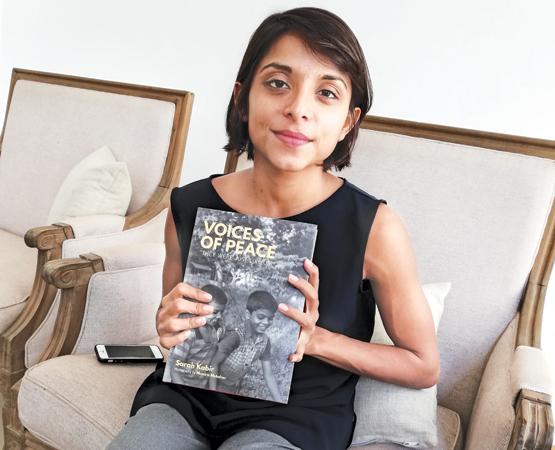
“I can’t believe I fought with these people who are like brothers to me now... they don’t isolate me. They show me love and respect… I regret what happened.” Thileepan, 47.
The two men who opened the door for me were not at all nonplussed by my café-au-lait appearance, and promptly welcomed me in. That night, mother nature had surprised Colombo, with heavy rains, so I arrived at young author Sarah Kabir’s house wet and muddy.
Just a week ago Sarah launched her book Voices of Peace amidst an audience of academics, activists and politicos at the Lakshman Kadirgamar Institute, Colombo. Her book which focuses on post-conflict reconciliation comes about a decade following the end of the 30-year-old civil war that left a great number of people scarred and searching for strength to keep living. Through her book Sarah provides twenty LTTE ex-cadres and ex-military personnel a platform to tell their compelling, and often heart-rending stories in their own words.
“It was important to let them tell their stories, not tell their stories for them,” the researcher and humanitarian worker said. Dressed in grey pants, a black blouse and hair neatly arranged in a bob, she looked graceful on the sofa in front of me, with her newly printed book on her lap.
In a way this book is her child. She has spent over two years nourishing it with research material, and interviewing and collecting necessary information in order to deliver a publication that will serve the sole purpose it was meant to serve- that is, to act as a tool to influence policy on peace-building.
To Sarah, the journey started in early 2016 when she was working in Cambodia for a peace-building organisation where she worked alongside an ‘amazing lady’ who asked her to help put the methodology for their project together. This was when she came across a quote by a Tunisian activist who said Speak to us; not about us. This struck Sarah, and she knew it was important to do the same in Sri Lanka where reconciliation process was still in its infancy.
The 20 narratives are presented uniquely, each voice having a distinctive ring to it as the story gradually unfolds. The stories are reinforced by Munira Mutaher’s striking photography. With narratives like “There were dead bodies everywhere… What I saw there was enough to make me want to fight.” Suren, 47, or,
“I found the infant’s finger, and the mother’s arm. The father’s body was lying under a lime tree. That day, six boys joined the LTTE.” (Anonymous, male) or,
“There is also respect when you join the Special Forces. People seek recognition in different ways, and this is how I sought it.” Pasan, 42, or
“.. Our children.. need to be aware of the value of peace, so that they don’t destroy it.” Sritharan, 43, or at the very end where 47 year old Senotharan says - “People should be brought to a place where they are all proud to say ‘I am Sri Lankan”.
Sarah outlines how ex-combatants who were actively involved in fighting have reached a place where they can move forward as one nation.
She first interviewed about 60 people though the help of the Ministry of Defence, NGOs and friends. Later the number was reduced to 20, 10 ex-LTTE cardres and 10 personnel from the Sri Lanka Military, based on the variety of stories they shared, how active they were during the war, age, if they were disabled, and how willing they were to open up about what happened.
But why the fighters?” I asked her.
“Every voice is important in this story. But there was no space for armed groups to share theirs. I saw this gap and wanted to fill it,” Sarah says.
After the selection was made Sarah has met each of her storytellers at least three times. Sometimes she would spend hours in their homes to let them narrate their stories in their own environment.
It was not always easy for the young oral historian to listen to the stories. There were times when Sarah felt numb and reached a point where she couldn’t empathize with her storytellers. This was when she knew that she had to do something before it seeps into her book. Her Tamil translator came to the rescue when she shared with Sarah an understanding of Vipassana meditation.
“So I went home. Stayed an entire day without talking. It helped,” Sarah said.
During the writing process, Sarah visited the North several times to remind herself of what her book is really about- the storytellers. When the book got delayed, she panicked. Even her professors told her that the worst thing she was doing by not publishing the book, was depriving her interviewees of the chance to be heard.
When the book was eventually launched, Sarah ‘felt really good’, especially because it resonates how the ex-combatants were willing to reconcile, which is what Sri Lanka needs.
“Very clearly the book is not about war, blood, guns and battle. It is more about people, what their lives were during the war, what they experienced and what their lives are like now,” she says, “I wanted to show their hopes for the future.”
Sarah believes Voices of Peace will help students to understand what war was like and how important peace is. “It is important that they do not go back to arms and throw away what we had fought hard for.”
Sarah’s passion to give voices that were marginalised an opportunity to be heard, is striking and empowering. I left her home that day thinking how much more we could do to achieve the reconciliation that is much talked about, but the results of which are still awaited. The 20 voices of Pasan, Thileepan, Shanuna and others will help show a path forward.
After all, we are all Sri Lankans!
You can get a copy of Voices of Peace at leading bookshops, or call 077 3515 262.
